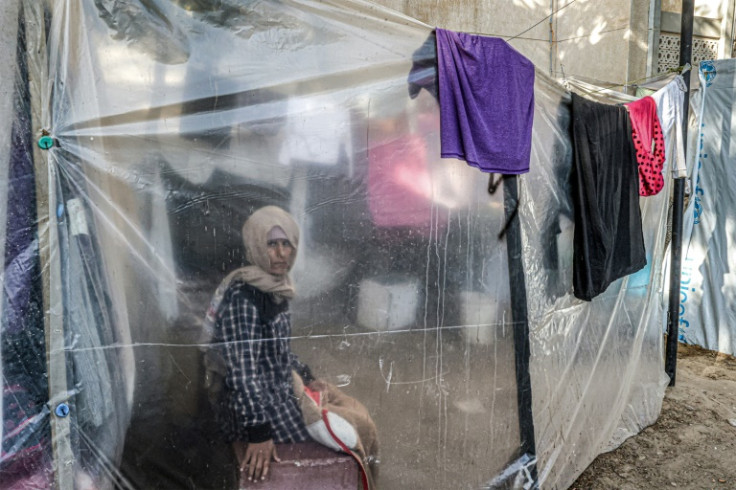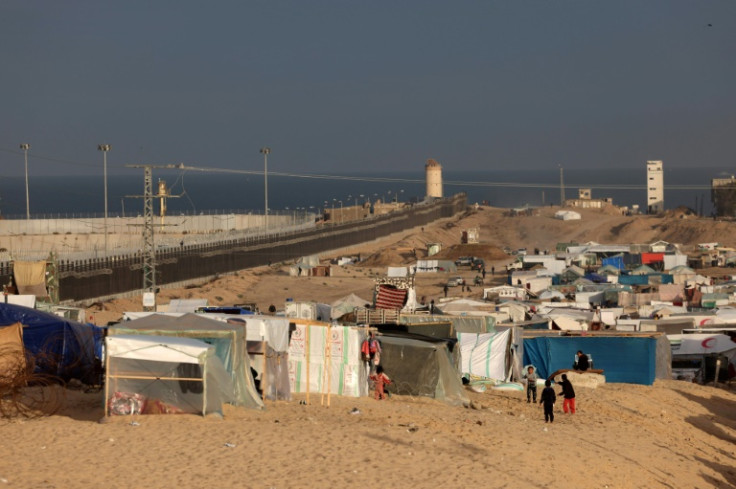Women And Girls In Gaza Are Using 'Parts Of Tents' To Replace Period Products
With blocks on humanitarian aid deliveries, women and girls in Gaza are witnessing the most severe cases of period poverty.

Women and girls in Gaza are witnessing the most severe cases of period poverty.
The limits on humanitarian and medical aid deliveries, which include tampons, sanitary towels, contraceptive pills that could delay or halt periods and other menstrual products, have left the females using tent scraps as a period product replacement.
"Imagine having to manage your period with no period products, toilet paper or soap, and no chance of being able to wash yourself," said Riham Jafari, an ActionAid worker for Palestine.
"This is the reality for hundreds of thousands of women and girls in Gaza right now... They are using parts of the tents or fibres. They cut off part of it to use as pads and some of them are using their extra clothes as pads," Jafari added.
The people trapped in Gaza need an "immediate and permanent ceasefire", the ActionAid worker added, recognising that "allowing more aid into Gaza will do nothing to stop dozens of deaths and injuries from airstrikes each day".
"The situation is catastrophic, the people of Gaza can't afford to wait any longer," Jafari said.
The UN and Human Rights Watch have since pointed the finger at the Israeli government for blocking humanitarian deliveries to Gaza.
Israel has also been criticised by the human rights organisation for rejecting vital items during truck inspections.
Amongst the items that have been rejected, are oxygen cylinders and anaesthetics for hospitals in the besieged enclave.
Israel said that the restrictions had been put in place out of fear that Hamas militants would seize the supplies.

In October last year, the UNHCR shared posts on social media that indicated that Hamas had stolen both fuel and medical supplies that were sent to refugees. Later, the UNHCR deleted its posts and declined to comment on the missing aid.
"Israeli forces are deliberately blocking the delivery of water, food, and fuel, while willfully impeding humanitarian assistance, apparently razing agricultural areas, and depriving the civilian population of objects indispensable to their survival", Human Rights Watch accused.
While refuting the accusation, Israel blamed the extreme delays in aid deliveries on the poor logistics by the UN and other aid agencies.
So far, according to the Hamas-run Health Ministry, more than 25,000 Palestinians have been killed in Gaza. More than 62,000 people have been wounded, the Health Ministry says.
At the end of last month, December, the World Health Organisation (WHO) said that it had successfully delivered fuel and other essential supplies to just two hospitals in the north and south of the Strip.
The conflict has displaced a staggering 85 per cent of Gaza's original 2.2 million population, including an estimated 50,000 pregnant women.
Ziad Issa, the Head of Humanitarian Policy at ActionAid called the delays in crucial aid "incredibly frustrating" since the level of need in Gaza has "soared to a staggering high".
"We now face a farcical situation in which mere miles separate warehouses teeming with rejected but vital items like food, shelter kits, and medical supplies, and desperate people who are starving and in pain," Issa added.
Urging international authorities to facilitate an emergency influx of aid into the Gaza Strip, the Head of Humanitarian Policy said: "The inspection process is far too slow and the number of trucks permitted entry is still below what Gaza used to get before 7th October.
"The relevant parties must do more to speed up the process and allow more trucks of aid into Gaza each day if there is to be any hope of averting a widespread famine and rising deaths from infection, illness and disease."
Disease and illness have been spreading like wildfire in Gaza, considering more than 96 per cent of the water supply in the Palestinian territory is "unfit for human consumption", says the UN.
© Copyright IBTimes 2025. All rights reserved.






















